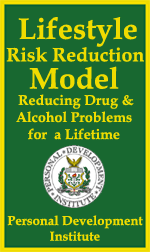The
Addictive Personality:
The
Addictive Personality:
Disorders by Enneagram Type
Don't know your Personality Type?
Click here to
take our Enneagram Test
While the Enneagram is a powerful tool for transformation,
transformational work is not possible for those actively abusing addictive
medications, alcohol, or controlled substances. Those suffering from
substance abuse problems must become "sober" on a regular basis
before they can sustain any in-depth inquiry into their true nature. Abuse
and neglect make it almost impossible to develop the sensitivity and
attention necessary to observe oneself with any clarity.
Fortunately, there are many resources available to support the addictive
personality in breaking free of various forms of addictions, including
books, workshops, support groups, therapy, and even inpatient care. The
Enneagram is not a substitute for those resources, but combined with them,
can be extremely helpful in understanding the roots of the addictive
personality.
All nine Enneagram
personality types can have any kind of addiction, and all nine types can
be codependent. We find some tendencies toward certain addictions in the
Enneagram types, however, and offer the following correlations as a
beginning guideline. They are not all-inclusive and are not intended to be a
complete discussion of this complex problem. Note also that the addictions
and disorders listed below apply not only to each Enneagram personality
type, but also each type's Direction
of Disintegration.
The following material is taken from The
Wisdom of the Enneagram (pages 350-352), and is offered as a preliminary
study of which addictive behaviors and other imbalances coincide with each
personality type. These observations are not meant to be all-inclusive or to
complete, only that they are a useful starting place for studying this
important application of the Enneagram.
Be sure, however, that you or someone else you are applying this
information to is correctly typed. You can take the scientifically validated
Riso-Hudson
Enneagram Type Indicator (RHETI Version 2.5) on this website. Also, be
aware that the types connected by a line on the Enneagram from your basic
personality type may also show up in your own pattern of addictions,
imbalances, and substance abuse.
Eating
Disorders & Addictions of the Types
Type
1 The Reformer
Excessive use of diets, vitamins, and cleansing techniques
(fasts, diet pills, enemas). Under-eating for self-control: in extreme
cases anorexia and bulimia. Alcohol to relieve tension.
Type
2 The Helper
Abusing food and over-the-counter medications. Bingeing,
especially on sweets and carbohydrates. Over-eating from feeling
"love-starved." Hypochondria to look for sympathy.
- Type
3 The Achiever
Over-stressing the body for recognition. Working out to
exhaustion. Starvation diets. Workaholism. Excessive intake of coffee,
stimulants, amphetamines, cocaine, steroids or excessive surgery for
cosmetic improvement.
- Type
4 The Individualist
Over-indulgence in rich foods, sweets, alcohol to alter mood,
to socialize, and for emotional consolation. Lack of physical
activity. Bulimia. Depressants. Tobacco, prescription drugs, or heroin
for social anxiety. Cosmetic surgery to erase rejected features.
- Type
5 The Investigator
Poor eating and sleeping habits due to minimizing needs.
Neglecting hygiene and nutrition. Lack of physical activity.
Psychotropic drugs for mental stimulation and escape, narcotics for
anxiety.
- Type
6 The Loyalist
Rigidity in diet causes nutritional imbalances ("I don't
like vegetables.") Working excessively. Caffeine and amphetamines
for stamina, but also alcohol and depressants to deaden anxiety.
Higher susceptibility to alcoholism than many types.
- Type
7
The Enthusiast
The type most prone to addictions: stimulants (caffeine, cocaine, and
amphetamines), Ecstasy, psychotropics, narcotics, and alcohol but tend
to avoid other depressants. Wear body out with effort to stay
"up." Excessive cosmetic surgery, pain killers.
- Type
8
The Challenger
Ignore physical needs and problems: avoid medical visits and
check-ups. Indulging in rich foods, alcohol, tobacco while pushing
self too hard leads to high stress, strokes, and heart conditions.
Control issues central, although alcoholism and narcotic addictions
are possible.
- Type
9 The Peacemaker
Over-eating or under-eating due to lack of self-awareness and
repressed anger. Lack of physical activity. Depressants and
psychotropics, alcohol, marijuana, narcotics to deaden loneliness and
anxiety.
Need Help! - Addiction Resources
 Your
FREE eBook, "Lifestyle
Risk Reduction Model - Reducing Drug and Alcohol Problems for a Lifetime"
The Lifestyle Risk Reduction Model is a prevention model
developed in the hopes of keeping people of
all ages from experiencing alcohol and drug problems throughout their
lifetime. The Lifestyle Risk
Reduction Model defines prevention as: A
comprehensive and systematic effort to reduce the risk that an individual
of any age who does not already have alcoholism or other
drug addiction will experience alcohol- or
drug-related health or impairment problems at any
point in life. Your
FREE eBook, "Lifestyle
Risk Reduction Model - Reducing Drug and Alcohol Problems for a Lifetime"
The Lifestyle Risk Reduction Model is a prevention model
developed in the hopes of keeping people of
all ages from experiencing alcohol and drug problems throughout their
lifetime. The Lifestyle Risk
Reduction Model defines prevention as: A
comprehensive and systematic effort to reduce the risk that an individual
of any age who does not already have alcoholism or other
drug addiction will experience alcohol- or
drug-related health or impairment problems at any
point in life.
If you or someone you know needs help with an alcohol, tobacco, or other
drug problem, this section will point you to resources for help. Search for
a treatment program near you, take an online screening test for alcohol
problems, or identify local and online support options.
AlcoholScreening.org
AlcoholScreening.org can help you identify your own alcohol consumption
patterns to determine if your drinking is likely to be harmful to your
health. From Join Together, at the Boston University School of Public
Health
DrugScreening.org
A sister site to Alcohol Screening, this free service from Join Together
helps you determine your likely risk of harms from using many kinds of
drugs, including marijuana, cocaine, inhalants, opiates, and more.
Find
Treatment
Search this database of over 11,000 alcohol and drug treatment programs to
find the facilities nearest you.
Frequently
Asked Questions
We've compiled answers to some of the most common questions people ask Join
Together about treatment for alcohol and drug addiction.
Support
and Recovery
Locate self-help and support group meetings in your area, online support
communities, and resources for concerned family and friends.
Please Visit the Free Mp3 Audio links below for Spiritual talks on
Addiction.
ADDICTION;
in the belly of a Big Fish - Episode 108.
The scientists tell us for every action there is an equal and opposite reaction. In our relationship with God for every action there is also a consequence. See how Jonah's life parallels ours when we go contrary to God's will.
The
meaning and purpose of God's Word - Segment Eight "The Importance of
Brokenness". "Except the grain of wheat falling into the ground die, it abides alone; but if it die, it bears much fruit" (John 12:24) Life is within the grain of wheat. But there is a shell, a very hard shell on the outside. As long as the shell is not split open, the wheat cannot grow.
The question here is not whether life exists inside the shell, but whether the shell on the outside is cracked open.
JACOB; he who wrestled with God - Episode 1022.
Instead of sitting down and trying to work things out with his brother, Jacob responded to conflict in what has become an all too familiar response in contemporary families, he hit the road. He said "I'm out of here. I'm going somewhere else to make a fresh start and leave my problems behind."
There is only one problem with Jacob's plan: no matter where you go, you take yourself. And a big part of self is....................
Why
does God allow Trials in our Lives - Episode 1105. Why does God allow trials in our Lives? (John 12:24-25)
Truly, truly, I say to you, Unless the grain of wheat that falls to the earth dies, it remains alone: But if it dies, it bears much fruit. There are two things you can do when trials, tests or tribulation comes your way.
The
Message of Isaiah the Prophet - Episode 1029. Isaiah preached for over a period of about 40 years and his message covers just about every theme and doctrine of the Bible. Let us consider six of the Great Statements made in the book of Isaiah and their application to us Today.
Inspiration
& Meditation Series - "for the rest of my Life" offers a plethora of data for the soul in itís infinite journey. Itís soliloquy is a sublime meditative series of affirmations & thoughts , rooted in eternity. This tree has many branches & multi-colored leaves all flowing in the stream of light , energy & the power of love.
Whether one be a follower of the various faiths of this world or other worlds , the design of D.G.C.ís work is enthralling. Take a moment & let the power of this work draw you into a new reality.
For more information about all of the Enneagram addictive personality
types and the self-defeating patterns they form with themselves and in
their relationships, see the Enneagram type
descriptions and the books Personality
Types and The
Wisdom of the Enneagram from which the above chart has been taken. For
practices that can be helpful to the types to overcome their addictions
and imbalances, see Understanding
the Enneagram and Enneagram
Transformations.
|



 Your
FREE eBook, "
Your
FREE eBook, "